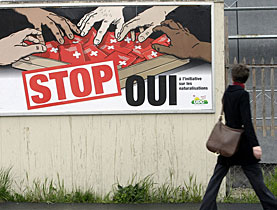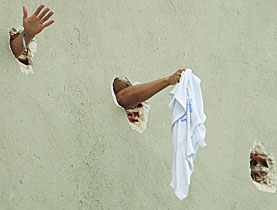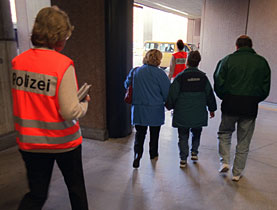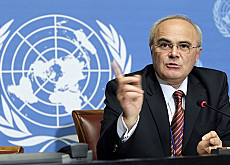Swiss in human rights hot seat

Switzerland has been defending its human rights record before the Geneva-based United Nations Human Rights Council as part of the Universal Periodic Review (UPR).
Foreign Minister Micheline Calmy-Rey and a 20-strong Swiss delegation were grilled by some 40 states on Thursday about issues ranging from racism, migrant and women’s rights, naturalisations to the lack of a national human rights institution.
Switzerland is part of the second group of 16 countries, including Pakistan, France and Japan, to be scrutinized over the next two weeks by the UN rights body.
At the end of the three-hour debate, Calmy-Rey underlined the “open dialogue” with UN member states, but admitted “Switzerland cannot rest on its laurels in terms of human rights”.
During the review there were numerous questions about the “xenophobic climate” in Switzerland, “incitements to racial hatred by certain political parties” and “racist posters”.
Discrimination against foreigners in Switzerland was frequently highlighted. Brazil questioned Switzerland’s anti-racism strategy, and Egypt, Britain and France called for a federal law banning discriminatory practices.
But in her opening address, Calmy-Rey said a specific federal law to deal with discrimination was not necessary and the current sectorial approach was sufficient.
Naturalisation initiative
A number of European countries, including Belgium, Finland and Norway, expressed concern about a naturalisation initiative to be voted on June 1 aimed at restoring ballots on citizenship applications.
They wondered, in the event the proposal is accepted, whether it would be “incompatible with Switzerland’s international commitments” and “respect for fundamental rights”.
The foreign minister replied that the authorities had examined the initiative’s conformity with international law and said it was not problematic.
Several countries, including France, Algeria, Canada, Germany and Slovenia – on behalf of the European Union – gave their support to a project to create a national human rights institution.
Calmy-Rey declared that the foreign ministry had set up a working group to look into the matter and would soon present a report to the Swiss government.
Delegations from Colombia, Haiti, India, Russia and Iran shared their reservations about migrants’ rights, in particular for women.
But the foreign minister rejected calls for Switzerland to ratify the UN Convention on Migrants’ Rights, saying it was “incompatible” with the new federal foreigners’ law.
NGO coalition
The 32 Swiss non-governmental organisations that provided input to the UPR said they were generally satisfied with the Swiss exercise.
They said the debate had been “very good”, with many interventions “in phase” with what they had published in their report to the council, but added that Swiss replies had sometimes been sketchy.
“The NGOs are satisfied with this first step. We are waiting for the follow-up measures to take account of the recommendations formulated by the states,” Daniel Bolomey, secretary-general of Amnesty International Switzerland, told a news conference.
The coalition was pleased with the way various states had put their finger on Switzerland’s main human rights problems: its migrant policy, racism and xenophobia in political certain campaigns.
“But a great deal of work needs to be done so that the UPR recommendations do not go unheeded,” said David Mathey-Doret.
While underlining international support for a national human rights body, Bolomey said he was sceptical about progress on this issue.
“I am a member of the working group and the problem is far from resolved; there is no majority in favour of a federal institution,” he told journalists.
The coalition now hopes the dynamic created by collaborating with the federal authorities can continue. It also expressed its support for the UPR, calling it a promising process.
“It’s a real opportunity to de-politicize the current human rights system. States have shown this morning that they are ready to play the game,” Alain Bovard, lawyer for Amnesty International, told swissinfo.
swissinfo, Simon Bradley in Geneva
Swiss Foreign Minister Micheline Calmy-Rey presented the concept of the Human Rights Council in March 2004 to replace the widely discredited and highly politicised UN Human Rights Commission created in 1946. The UN officially accepted the idea in September 2005.
The first session of the UN Human Rights Council took place in June 2006 at its headquarters in Geneva. The Council reports directly to the UN General Assembly.
It consists of 47 member states, which are selected with absolute majority by the UN General Assembly. It meets at least three times a year and can also hold special meetings to discuss crisis situations.
The 27 seats of African and Asian countries heavily outvote western countries, which hold seven seats on the council.
During the review exercise, which began in April, the records of all 192 UN member states, regardless of their size, wealth, military or political importance, are examined using a common mechanism.
The second session of the Universal Periodic Review takes place in Geneva from May 5-16, during which 16 states will have their human rights records examined. The first session took place from April 7-18.
The review will be facilitated by groups of three States members of the Council, or troikas, which will act as rapporteurs. Uruguay, Pakistan and South Africa supervised the Swiss presentation.
The council will vote on reports compiled from the first and second UPR sessions at its next regular session in June.

In compliance with the JTI standards
More: SWI swissinfo.ch certified by the Journalism Trust Initiative




You can find an overview of ongoing debates with our journalists here. Please join us!
If you want to start a conversation about a topic raised in this article or want to report factual errors, email us at english@swissinfo.ch.